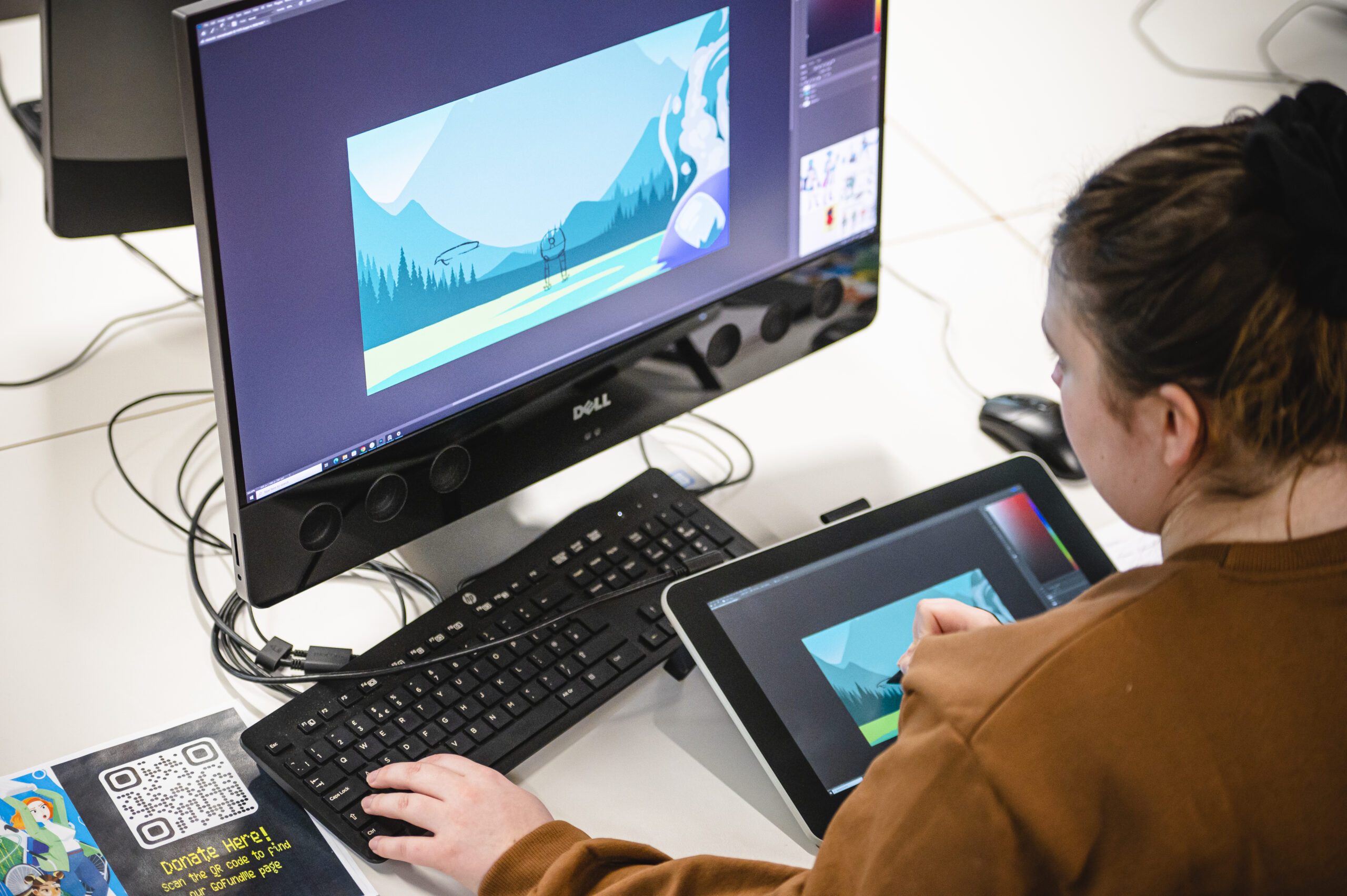Duration:
2 years full-time | Top-up available
Location:
Confetti Nottingham Campus, NTU
UCAS course code:
I700
Institution code:
N91
Quick! We have some places remaining for this September. Check out the entry requirements below.
On this foundation VFX Production degree you’ll explore the visual effects industry for film and television while developing the artistic and technical skills expected of a VFX artist, across a range of disciplines, applications and technology.
Visual effects has become an integral part of the production process for film, television and advertising and is one of the most creative and technical aspects of modern media production.
You will have the opportunity to explore a wide array of processes and workflows associated with VFX production through studio practice, technical workshops, as well as academic research and study.
By the end of the course you’ll have developed a strong portfolio of both 2D and 3D VFX work, tailored to your own career aspirations.
On this course you’ll be working on industry-standard software, such as Nuke, Maya and will have access to a wealth of high end camera and studio technology.
This course is for you if:
- you enjoy exploring the technical elements of media
- you are excited by the idea of working within a studio
- you are good at 2D and 3D visual effects
Progression route
Top-up your degree to a full BSc (Hons) qualification in Visual Effects at NTU
Clearing 2024
- 48 UCAS points from up to three qualifications; and
- GCSE – English and Maths Grade C / 4
Spaces are limited, so call NTU’s Clearing hotline on 0115 848 6000 to secure your place.
2025 entry
- 64 UCAS Tariff points; and
- GCSE – English and Maths Grade C/4
To find out what qualifications have tariff points, please use our tariff calculator.
Other qualifications and experience
We may also consider credits achieved at other universities and your work/life experience through an assessment of prior learning. This may be for year one entry, or beyond the beginning of a course where applicable, for example, into year 2. Our Recognition of Prior Learning and Credit Transfer Policy outlines the process and options available for this route.
Meeting our entry requirements
Hundreds of qualifications in the UK have UCAS tariff points attached to specific grades, including A levels, BTECs, T Levels and many more. You can use your grades and points from up to four different qualifications to meet our criteria. Enter your predicted or achieved grades into our tariff calculator to find out how many points your qualifications are worth.
Preparing for the financial side of student life is important, but there’s no need to feel anxious and confused about it. We hope that our fees and funding pages will answer all your questions.
Asset Production for VFX Sequences (20 Credit Points)
This module introduces you to the assets you’ll be working with in VFX productions. You’ll develop your skills operating a range of digital technologies to capture video and audio for VFX sequences. By understanding the mechanisms and technologies involved in image and data origination, you’ll develop an understanding of the relationship between principal photography and the VFX professional.
Creating 3D Content for VFX (40 Credit Points)
This module introduces you to the main principles of creating 3D content and integrating created 3D content with another source (typically a digital film camera) and making it conform or fit into that environment. The module also introduces the important notion of the virtual camera, and how the 3D software camera needs to match and replicate the qualities of the physical or real film camera.
Foundation in VFX Compositing and Matte Production (40 Credit Points)
Develop your skills in compositing when working with 2D Graphics. You’ll be introduced to 2D image basics, including layering, masking, keying, and notions of colour space, project set-ups and flexible reusable templates. You’ll also spend time exploring the history of compositing and its roots, as well as examining different methods by which mattes can be created and how they might be manipulated and used in VFX compositing.
Digital Environments for Visual Effects (20 Credit Points)
Examine the art of matte painting and the role of the environment technical director. With the advent of 3D CGI the matte painter’s job has increasingly moved away from creating 2D backdrops of landscape and cityscape to include working with geometry in what is often phrased as 2.5D. You’ll explore painting techniques and their role in creating environments whilst developing skills in photo real paint artistry.
3D Matchmoving and Rig Removal (20 Credit Points)
This module concentrates on the process of achieving an accurate camera solve or matched object geometry from plates shot with moving film cameras. You’ll explore the application of camera movement within an image and the difference between object tracking and camera tracking. You’ll develop skills in the creation of more realistic and professional VFX sequences as well as learning the important process of rig removal.
Rigging, Digital Sculpture and Creature Effects (40 Credit Points)
Explore the role of the rigger and the working relationship and interactions with animators and modellers. You’ll learn to design, create, test and maintain character, vehicle, cloth and prop setups working with animators and modellers to meet the technical needs of a project. You’ll also extend and advance your skills in modelling as the module complements and builds on your existing hard surface modelling skills with soft surface modelling aimed at creating organic forms to technical specifications.
Effects Animation for VFX (40 Credit Points)
You’ll learn about making particle systems, structures, cloth, fluids and crowds move under the forces of physics. Within the VFX industry these are the jobs of an effects animator or effects technical director. You’ll learn to use VFX software to simulate complex behaviours and phenomena (fires, breaking glass, fluids etc.) and be able to understand and communicate using the language of Newtonian mechanics.
Industry Practice (20 Credit Points)
You’ll undertake appropriate self-directed projects, working collaboratively on creative work, allowing you to directly apply the knowledge and skills learnt throughout the programme in the context of the workplace. This module aims to develop your overall professionalism and provide you with the knowledge and resources to begin a career in the creative industries.
The nature of creative industries is increasingly defined by freelance and self-employed models of work. Consequently, individuals seeking work in industry need to appreciate the pressures of working on multiple projects to strict deadlines and the subsequent demands this place on time and resources. Similarly, an understanding of professional practice and the legal and economic imperatives in industry is important, as is effective communication, self-efficacy and autonomy. This module aims to develop these skills and knowledge by challenging you to develop a range of self-directed projects.
Do It For Real
Industry Week
Studying at Confetti you’ll take part in Industry Week where you’ll be able to meet a range of professionals within your field of interest as well as other areas of the creative industries.
Past guests include Framestore, Industrial Light and Magic, The Mill, Access VFX and Aardman Animations.
Student work
Our Talent Development team works closely with course leaders to link students with opportunities across the industry. VFX Production students have previously worked with and visited leading companies, such as:
- Framestore
- Notts TV
- Shock FX
On this course you’ll study in Confetti HQ – our brand new £9.1million digital media hub. You’ll have access to:
- Industry Spec Workstation PCs
- Industry-standard digital film cameras and lights
- Green Screen studio space
- Professional Studio facilities
Specialist software, including:
- Nuke
- Mari
- Autodesk Suite (Maya, Mudbox)
- Houdini
- Adobe Creative Suite
- Zbrush,
- Unreal Engine
- Quixel Mixer
- Wacom Cintiq graphics tablets
- Motion capture facility
Courses
After finishing your foundation degree, you may decide to go straight into industry or top-up to a full honours degree.
If you achieve a Commendation or higher grade, you’ll be able to progress onto the Level 6 (Final Year) of the popular BSc (Hons) VFX at NTU course.
For those completing their foundation degree with a Pass, you’ll have the opportunity to progress onto Level 5 (Year Two) of the course.
If you choose to progress onto the full honours degree at NTU, you’ll be invited to a transition tutorial with the Illustration course team at NTU. The aim of the tutorial is for you to meet the course team; present your work; and for the team to ensure any appropriate support (if necessary) is made available to you before you progress.
What roles do our graduates go on to?
- Roto artist
- Compositor
- 3D artist
- Digital preparation
- Layout artist
- Lighting technical director
- Match move artist
- Matte painter
- Animator
- Technical director
- VFX supervisor
NTU Employability support
Our support doesn’t end when you graduate. As a Confetti and NTU student you will be entitled to dedicated graduate employability support for up to three years after you complete your studies. You’ll have access to exclusive events, initiatives and work experience opportunities to support you in the early stages of your graduate career.






